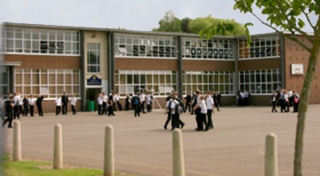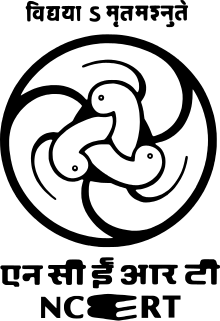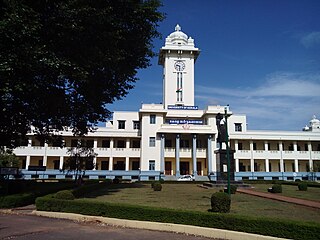
A school is an educational institution designed to provide learning spaces and learning environments for the teaching of students under the direction of teachers. Most countries have systems of formal education, which is sometimes compulsory. In these systems, students progress through a series of schools. The names for these schools vary by country but generally include primary school for young children and secondary school for teenagers who have completed primary education. An institution where higher education is taught, is commonly called a university college or university.

Education in India is primarily managed by state-run public education system, which fall under the command of the government at three levels: Central, state and local. Under various articles of the Indian Constitution and the Right of Children to Free and Compulsory Education Act, 2009, free and compulsory education is provided as a fundamental right to children aged 6 to 14. The approximate ratio of public schools to private schools in India is 7:5. Major policy initiatives in Indian education are numerous. Up until 1976, education policies and implementation were determined legally by each of India’s constitutional states. The 42nd amendment to the constitution in 1976 made education a ‘concurrent subject’. From this point on the central and state governments shared formal responsibility for funding and administration of education. In a country as large as India, now with 28 states and eight union territories, this means that the potential for variations between states in the policies, plans, programs and initiatives for elementary education is vast. Periodically, national policy frameworks are created to guide states in their creation of state-level programs and policies. State governments and local government bodies manage the majority of primary and upper primary schools and the number of government-managed elementary schools is growing. Simultaneously the number and proportion managed by private bodies is growing. In 2005-6 83.13% of schools offering elementary education were managed by government and 16.86% of schools were under private management. Of those schools managed privately, one third are ‘aided’ and two thirds are ‘unaided’. Enrolment in Grades 1-8 is shared between government and privately managed schools in the ratio 73:27. However in rural areas this ratio is higher (80:20) and in urban areas much lower (36:66).

Jamia Millia Islamia is a central university located in New Delhi, India. Originally established at Aligarh, United Provinces during the British Raj in 1920, it moved to its current location in Okhla in 1935. It was given the deemed status by University Grants Commission in 1962. On 26 December 1988, it became a central university.

Nawalgarh is a heritage city in Jhunjhunu district of Indian state Rajasthan. It is part of the Shekhawati region and is midway between Jhunjhunu and Sikar. It is 30 km from Sikar and 39 km from Jhunjhunu. Nawalgarh is famous for its fresco and havelis and considered as Golden City of Rajasthan. It is also the motherland of some great business families of India.

Modern School is a co-educational, private school in New Delhi, India. It was founded in 1920 by Lala Raghubir Singh, a prominent Delhi-based businessman and philanthropist, who desired an institution that combined the "best of ancient Indian tradition with the needs of the times." It was the first private and coeducational school established in Delhi after the capital of the British Raj shifted to the city.

Chalakudy is a municipal town situated on the banks of Chalakudy River in Thrissur district of the Kerala state in India. It is the headquarters of Chalakudy taluk. It is the base camp for travellers to Athirappilly Falls and Vazhachal Falls. Chalakudy lies on National Highway 544 and located about 47 km (23 mi) north of the city of Kochi, and 30 km (19 mi) south of Thrissur.
St. Paul's School is an independent boarding school for boys in the town of Darjeeling, West Bengal, India. It is known as "Eton of the East" because it is thought to follow the similar cultural and traditional values of Eton College. St. Paul's is one of the oldest public schools in Asia. Entrance tests for admission are held every September. The school follows the ICSE curriculum until class 10 and the ISC curriculum for classes 11 and 12.

The National Council of Educational Research and Training (NCERT) is an autonomous organisation of the Government of India which was established in 1961 as a literary, scientific and charitable Society under the Societies' Registration Act. Its headquarters are located at Sri Aurbindo Marg in New Delhi. Dr. Sridhar Srivastava is Director of the council since 2021.
St Joseph's Convent School, Sagar (SJC) is a private coeducational Roman Catholic school in the Cantonment area of Sagar, Madhya Pradesh, India. It is affiliated to the Central Board of Secondary Education, New Delhi.

The importance and antiquity of education in Kerala is underscored by the state's ranking as among the most literate in the country. The educational transformation of Kerala was triggered by efforts of the Church Mission Society missionaries, who were the pioneers that promoted mass education in Kerala, in the early decades of the 19th century. The local dynastic precursors of modern-day Kerala—primarily the Travancore Royal Family, the Nair Service Society, Sree Narayana Dharma Paripalana Yogam and Muslim Educational Society (MES)—also made significant contributions to the progress on education in Kerala. Local schools were known by the general word kalaris, some of which taught martial arts, but other village schools run by Ezhuthachans were for imparting general education. Christian missionaries and British rule brought the modern school education system to Kerala.

St. Xavier's School is a private Catholic secondary school located in Bokaro Steel City, Jharkhand, India. The Christian minority school was founded by the Jesuits in 1966 primarily to serve the children of those working at Bokaro Steel Plant. It is the oldest private school in Bokaro and the only ICSE school in the main township of Bokaro. It is one of the top schools of the city.

The Cambridge School is a private international school that is located in Doha, Qatar, the school provides an education based on the National Curriculum for England to students from Kindergarten to Year 13. The school prepares students for the IGCSE, AS and A Level, following the Cambridge International Examinations Board. The school has grown from just under 300 students seven years ago to almost over 1,500 students with over 60 different nationalities. Some of the teachers are from the United Kingdom, although most of them are from South Africa and India. The school is founded by Mohammed Taleb Mohammed Al Khouri and managed by the Taleb Group. The company also own and manage two other schools in Qatar, Cambridge International School for Girls and Doha Modern Indian School.

Doha British School (DBS), established and opened in October 1997, is a co-educational comprehensive International school in the Ain Khaled area of Doha, in the State of Qatar. It offers international education to students from pre-school to Year 13. The students are of over 85 nationalities.
All India Secondary School Examination, commonly known as board exams, is a centralized public examination that students in schools affiliated with the Central Board of Secondary Education in India take after class 10. The board conducts the examination during the period of February every year even after implementing the ambitious project of Continuous and Comprehensive Evaluation. Now that the board has ended the Continuous and Comprehensive Evaluation pattern as a result Joint Employment Test, NEET, etc., the exam is conducted by the National Testing Agency instead. In this exam, Mathematics, Science and S.St are compulsory with any two languages. Students can also opt skill subject such as information technology, painting, yoga, music or artificial intelligence. Successful candidates are awarded the Secondary School Completion Certificate, a Statement of Marks, and a Migration Certificate stating that the candidate has completed Secondary Schooling and can pursue higher education. For the 2016-17 academic year, the Central Board of Secondary Education has revived the old system of syllabus and marking scheme India has state exams and central exams.
The community of Indians in Qatar includes Indian expatriates in Qatar, as well as people born in Qatar of Indian origin. Qatar has a total population of 2,740,479 as of May 2019. The Indian population in the country currently stands at around 691,000.
Indian School Al Seeb, located in the Sultanate of Oman, was established in 2002 and is registered by the Central Board of Secondary Education of India. The kindergarten-to-grade-12 school has an enrollment of about 2,500 students, and moved into its own building on 1 October 2007. The school is located on a 13,000-square-metre (3.2-acre) campus and includes a playing field, basketball court, science and computer labs, classrooms, audio-visual rooms, activity rooms, staff rooms and parking. In the Senior Secondary level students are offered Science, Commerce & Humanities streams with Informatics Practices, Computer Science, Psychology, Physical Education & Fine Arts (Painting) as optional subjects.

The National Institute of Open Schooling (NIOS), formerly National Open School, is the board of education under the Union Government of India. It was established by the Ministry of Human Resource Development of the Government of India in 1989 to provide education to all segments of society under the motive to increase literacy and aimed forward for flexible learning. The NIOS is a national board that administers examinations for Secondary and Senior Secondary examinations similar to the CBSE and the CISCE. It also offers vocational courses after the high school.
Podar International School is a group of schools which is a part of the Podar Education Network that was established in 1927 by Sheth Anandilal Podar, with Mahatma Gandhi as the first President of the trust. The group is headquartered in Mumbai. It offers educational streams such as the Central Board of Secondary Education (CBSE), Council for the Indian School Certificate Examinations (CISCE), Secondary School Certificate (SSC), Cambridge (IGCSE) and International Baccalaureate (IB).

Global Indian School is a private Indian K-12 school in Ajman, United Arab Emirates, established in 1988. The school is recognized by the UAE's Ministry of Education and affiliated with the Central Board of Secondary Education in New Delhi, India.














